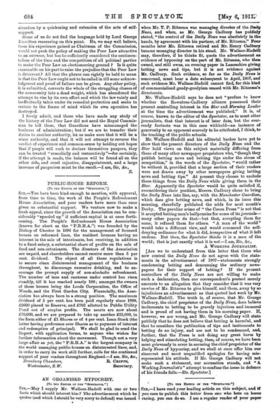PUBLIC-HOUSE REFORM.
[TO THE EDITOR. Or THE "SPECTATOU."]
SIR,—You have been kind enough to mention, with approval, from time to time, the work of the People's Refreshment House Association, and your readers have more than once given us substantial support. We venture now to make a fresh appeal, since the growth of the Association can be con- siderably "speeded up" if sufficient capital is at once forth- coming. The People's Refreshment House Association (known for short as the " P.R.H.A.") was founded by the Bishop of Chester in 1896 for the management of licensed houses on reformed lines, the resident licensee having no interest in the sale of intoxicants, but receiving, in addition to a fixed salary, a substantial share of profits on the sale of food and non-intoxicants. The directors of the Association are unpaid, and shareholders cannot receive more than 5 per cent. dividend. The object of all these regulations is to secure clean disinterested management of the business throughout, to discourage excessive drinking, and to en- courage the prompt supply of non-alcoholic refreshment. The number of inns and canteens under control has risen steadily, till it has reached nearly 100; amongst the owners of these houses being the Leeds Corporation, the Office of Woods, and the First Garden City. Financially, the Asso- ciation has always been in a strong position. The maximum dividend of 5 per cent. has been paid regularly since 1899, £2600 placed to Reserve, and £762 allotted to Public Utility Fund out of surplus profits. The assets are now about £70,000, and we are prepared to take up another £25,000, in the form either of £1 Shares or of 4 per cent. Loan Stock (the latter having preference over Shares as to payment of interest and redemption of principal). We shall be glad to send the Report, with application forms, to anyone who wishes for further information about the movement. Though not a very large affair as yet, the " P.FL.H.A." is the largest company in the world managing public-houses on disinterested lines, and, in order to carry its work still further, calls for the continued support of your readers throughout England.—I am, Sir, &e.,










































 Previous page
Previous page